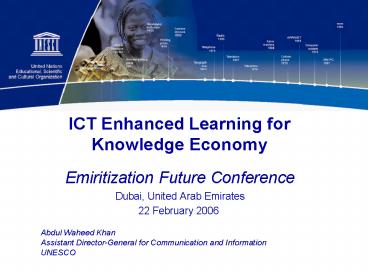ICT Enhanced Learning for Knowledge Economy - PowerPoint PPT Presentation
1 / 22
Title:
ICT Enhanced Learning for Knowledge Economy
Description:
ICT Enhanced Learning for Knowledge Economy Emiritization Future Conference Dubai, United Arab Emirates 22 February 2006 Abdul Waheed Khan Assistant Director-General ... – PowerPoint PPT presentation
Number of Views:207
Avg rating:3.0/5.0
Title: ICT Enhanced Learning for Knowledge Economy
1
ICT Enhanced Learning for Knowledge Economy
- Emiritization Future Conference
- Dubai, United Arab Emirates
- 22 February 2006
- Abdul Waheed Khan
- Assistant Director-General for Communication and
Information - UNESCO
2
- Knowledge is like light.Weightless and tangible,
it can easily travel the world, enlightening the
lives of people everywhere. - World Development Report,
- The World Bank
3
If knowledge is the engine of development, then
learning must be its fuel. Takeushi
4
It is difficult to solve tomorrows problems with
yesterdays tools and concepts.
5
Knowledge the engine of development
- Economic growth
- Social transformation
- Cultural enrichment
- Political empowerment
6
Knowledge Societies
7
ICT and development
8
Educational Challenges
- Access and reach
- Equity and gender
- Quality and effectiveness
- Relevance and lifelong learning
- Cost and efficiency
9
Relevance and Lifelong Learning
- Societal change from labour intensive work to
knowledge intensive work - Constant advancement in technology
- Need to teach the 7Cs
- Critical thinking
- Creativity
- Collaboration
- Cross-cultural understanding
- Communication
- Computing
- Career development
10
Linkage of Education to Poverty Reduction and
Human Development
Human Capitals and Productivity
Macro Economic Growth and Development
Family Health and Nutrition
Reduced Poverty
Education
Personal Development
Societal Development
11
Learning
- Learning as progressive change from
- Ignorance to knowledge
- Inability to competence
- Indifference to understanding
12
New forms of learning
- New literacies
- Technology literacy
- Information literacy
- recognize when information is needed
- have the ability to locate, evaluate and use
effectively the needed information
13
New forms of learning
- New pedagogical paradigm
- Learning as a constructive process
- More than acquisition of basic literacy skill
- Non-formal and non-linear learning
- New flexible learning environments
14
New forms of learning
- Nature of knowledge
- Increasingly transdisciplinary
- Increasingly contextual
- Application oriented (learning by doing)
- Must reflect local/regional realities
15
ICT and capacity building
- Improves educational quality
- Increases access to basic learning for everyone
- Improves educational management
- Enables lifelong learning opportunities
- Capacity to reach disadvantaged populations
16
ICT and capacity building
- Enhances diverse and collective learning
processes - Enables development of non-formal and informal
learning environments - Shifts learning process
- from teaching to self-directed learning
- from one-time event to lifelong learning process
17
Media Technology for Distance Learning
Media Non-interactive Interactive
Print-based (text and graphics based) Text-books Self-instructional print materials (partially interactive)
Audio-based Audiocassette, Radio broadcast Telephone, audio conference, audio-vision, interactive radio
Video-based Video, TV Broadcast Video conference Interactive television
Computer-based Textual delivery of materials in CD, Floppy static web-pages Integrated multimedia, computer-mediated communication, email, chat, discussion groups and automated response systems.
18
New Media Old Media
Computer Multimedia CBT Internet WWW CD/DVD Virtua
l Reality
Radio Television Audiotape Videotape Books Slide
s
Digital learning resources Easy to manipulate,
duplicate and transport Reusable with little
difficulty Globally accessible through
network Provides multi-sensory, multiple media in
an integrated way Personalized instruction Cost
intensive, though it is decreasing
Ephemeral in nature for radio and TV Easy access
to large number of people Reuse difficult Most
useful for mass delivery Difficult to manipulate
and do corrections
19
WSIS and capacity-building
- Capacity-building, a central elementof the WSIS
Action Plan - Competences in ICT
- Skills to benefit fully from the Information
Society - Essential role of ICT literacy
- ICT as a tool
- ICTs to achieve universal education worldwide
- ICT for improved lifelong learning
20
Critical success factors
- Sustainability
- A vision
- Micro and macro approaches
- Devoted owners
- Government support
21
Critical success factors
- Public/private partnerships
- Localization (currricula and content)
- Take account of community languages
- Build on voluntarism
- Monitoring and evaluation
22
Your comments and questions please
Thank you your patience, listening and
interaction































